 Petzlover
Petzlover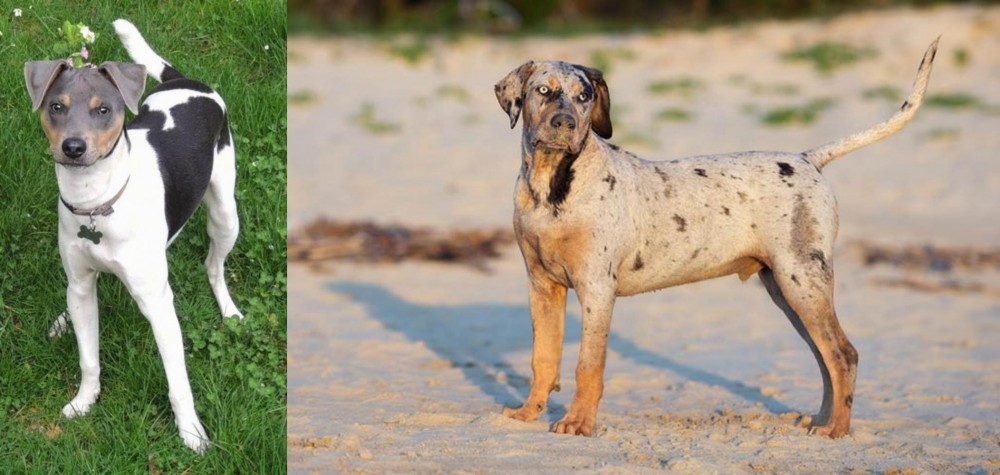 Brazilian Terrier is originated from Brazil but Catahoula Cur is originated from United States. Brazilian Terrier may grow 31 cm / 12 inches shorter than Catahoula Cur. Brazilian Terrier may weigh 38 kg / 83 pounds lesser than Catahoula Cur. Both Brazilian Terrier and Catahoula Cur has same life span. Brazilian Terrier may have less litter size than Catahoula Cur. Both Brazilian Terrier and Catahoula Cur requires Low Maintenance.
Brazilian Terrier is originated from Brazil but Catahoula Cur is originated from United States. Brazilian Terrier may grow 31 cm / 12 inches shorter than Catahoula Cur. Brazilian Terrier may weigh 38 kg / 83 pounds lesser than Catahoula Cur. Both Brazilian Terrier and Catahoula Cur has same life span. Brazilian Terrier may have less litter size than Catahoula Cur. Both Brazilian Terrier and Catahoula Cur requires Low Maintenance.
 Though its exact origins are questioned it is known that the Brazillian Terrier was developed in Brazil and along with the Fila Brasileiro, are the only authentic Brazillian breeds. In the early 1800’s the Jack Russel Terrier, Fox Terrier, Chihuahuas and Miniature Pinschers were mixed to create the Brazillian Terrier. The Terrier breed was brought to Brazil by Europeans and there were probably both the Jack Russel and the Fox Terrier in the mix. Very popular within its own country the Brazillian Terrier is barely known outside Brazil. They were registered in 1973 even though they have been around in Brazil since the 1800’s. They are both single and pack hunting dogs. They chase and surround prey until the prey becomes too exhausted to run or fight. The Brazillian Terrier is larger than any European or North American Terrier. They are also less aggressive than other terrier types so that pack hunting became possible. They were built to work in the heat for long periods of time. Their stamina far surpassed other terriers as did their resistance to parasites and diseases.
Though its exact origins are questioned it is known that the Brazillian Terrier was developed in Brazil and along with the Fila Brasileiro, are the only authentic Brazillian breeds. In the early 1800’s the Jack Russel Terrier, Fox Terrier, Chihuahuas and Miniature Pinschers were mixed to create the Brazillian Terrier. The Terrier breed was brought to Brazil by Europeans and there were probably both the Jack Russel and the Fox Terrier in the mix. Very popular within its own country the Brazillian Terrier is barely known outside Brazil. They were registered in 1973 even though they have been around in Brazil since the 1800’s. They are both single and pack hunting dogs. They chase and surround prey until the prey becomes too exhausted to run or fight. The Brazillian Terrier is larger than any European or North American Terrier. They are also less aggressive than other terrier types so that pack hunting became possible. They were built to work in the heat for long periods of time. Their stamina far surpassed other terriers as did their resistance to parasites and diseases.
Many farmers and plantation owners came to values them for their ability to hunt down and eliminate vermin on the land and thus help with increased production of livestock and crops. They were so loved by the farmers and plantation owners that they began known as the “dog of the common people”. Yet it was not only the rural folks who valued this breed, but the people of the cities did as well. Because they were good ratters, a reasonable size, affectionate and loyal, many urban households sported a Brazillian Terrier. The breed spread throughout the country.
The Brazillian Terrier was kept mostly pure bred throughout its history but due to lack of pedigrees and paperwork it was not recognized by any kennel club unit 1973 when Brazillian breeders formed the Clube de Fox Paulistinha or CPF. They had a standard developed and created a stud book. By 1991 they were still not officially recognized but the CFP and the CBKC (Confederacio Brasilera de Cinofilia) began the process of establishing acceptable pedigrees and recognition of the breed. The FCI recognized the breed in 2007.
 The Catahoula Cur is also known as the Catahoula Leopard Dog or the Louisiana Catahoula. The dog hails from Louisiana, United States.
The Catahoula Cur is also known as the Catahoula Leopard Dog or the Louisiana Catahoula. The dog hails from Louisiana, United States.
It is thought that the Catahoula Cur or Catahoula Hound as it is also known, used to be a hunting dog. The first settlers in Louisiana needed a strong dog to help them with hunting wild hogs and they bred their dogs with other dogs belonging to the locals. This gave them a strong, resilient dog that could take on the wild hogs and also protect their livestock.
Dogs who have no doubt been brought into the mix to produce the Catahoula Cur are mastiffs, Beaucerons, sighthounds and wolves.They are today more commonly referred to as Catahoula Leopard Dogs.
 The Brazillian Terrier is a small to medium sized dog with a white – tricolor (tan and black) coat. It has a narrow chest, a triangular rather flat skull, the tail is docked, folded, half pricked hears, and the body is well-balanced. Its legs are long and athletic, and the coat is very short and very fine. He has round eyes that can be green, blue, brown or gray. They are very much like the Jack Russel in temperament. His expression should reflect that temperament in its eagerness and alertness.
The Brazillian Terrier is a small to medium sized dog with a white – tricolor (tan and black) coat. It has a narrow chest, a triangular rather flat skull, the tail is docked, folded, half pricked hears, and the body is well-balanced. Its legs are long and athletic, and the coat is very short and very fine. He has round eyes that can be green, blue, brown or gray. They are very much like the Jack Russel in temperament. His expression should reflect that temperament in its eagerness and alertness.
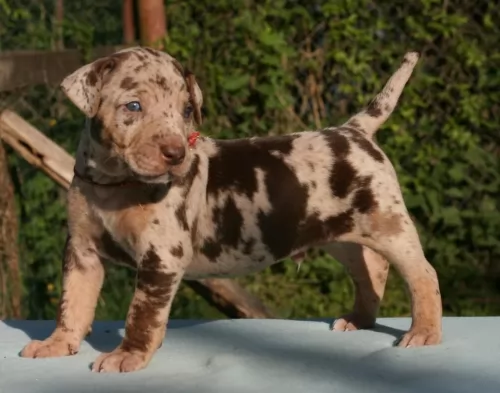 There are varying sizes for Catahoulas and a typical height is 51–66cm and weighing anything from 18 – 51kg. These Cathoula Cur’s come in different colors too, but the leopard-like coat is a dominant feature with this dog.
There are varying sizes for Catahoulas and a typical height is 51–66cm and weighing anything from 18 – 51kg. These Cathoula Cur’s come in different colors too, but the leopard-like coat is a dominant feature with this dog.
While there are solid colors, you can expect red- and blue merle, grey-, black, patchwork and brindle too.
The length of the coat varies somewhat too and while the coat is essentially short and smooth, there are Catahoulas where the coat is a little longer and more coarse.
The eyes of the Catahoula Cur are another interesting feature and both eyes can be the same color, but in some instances the one eye can be brown while the other could be blue, green or gray. The ears of the Catahoula Cur are medium in size and are floppy, dropping down close to the head.
The Catahoula Cur is an intelligent dog and also active and full of sports. You can’t call this dog aggressive, but merely assertive, being strong-willed. He is also affectionate and loyal, loving to spend time with his human family.
He makes a wonderful family pet, complete with children as well as other pets in the home, more so when he has been trained and socialized. These dogs are bright and alert and they also make excellent watch dogs. People who have owned a Catahoula Cur will tell you that these are wonderful pets, full of life and personality.
 The Brazillian Terrier is very much like his ancestor the Jack Russell. Like the JR Terrier he is friendly, intelligent, alert, playful, and loves to dig. They are courageous and fearless. They will obey but only if they know and believe you are really in charge. Otherwise they are intelligent enough to be very independent, determined and willful. At the same time, they are utterly loyal to their people. He needs a lot of toys but don’t let him live with other small animals. His hunting instincts may be the strongest of all terriers and he may harm small animals in the home. You have to teach him when to stop barking. Their love of play would consume your entire day if you let them. You should understand the terrier personality before you acquire a Brazillian Terrier.
The Brazillian Terrier is very much like his ancestor the Jack Russell. Like the JR Terrier he is friendly, intelligent, alert, playful, and loves to dig. They are courageous and fearless. They will obey but only if they know and believe you are really in charge. Otherwise they are intelligent enough to be very independent, determined and willful. At the same time, they are utterly loyal to their people. He needs a lot of toys but don’t let him live with other small animals. His hunting instincts may be the strongest of all terriers and he may harm small animals in the home. You have to teach him when to stop barking. Their love of play would consume your entire day if you let them. You should understand the terrier personality before you acquire a Brazillian Terrier.
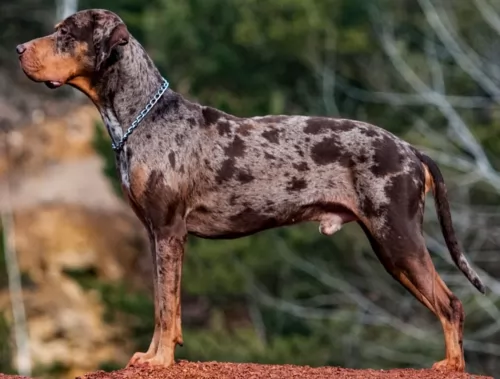 Catahoula dogs are the kind of dogs that make perfect family pets as they are all rounders. They’ve got characteristics that everybody wants in a dog. They are naturally protective, even they are not described as aggressive dogs. With training and socialization they get on well with children as well as other pets in the home. He is alert and territorial, which makes him a good watchdog, more so because he doesn’t particularly like strangers.
Catahoula dogs are the kind of dogs that make perfect family pets as they are all rounders. They’ve got characteristics that everybody wants in a dog. They are naturally protective, even they are not described as aggressive dogs. With training and socialization they get on well with children as well as other pets in the home. He is alert and territorial, which makes him a good watchdog, more so because he doesn’t particularly like strangers.
Intelligent and independent, training makes him wonderfully obedient and relaxed. However, give him the chance for ball games and a walk, and he is more than ready.
He is used to being a guard- and hunting dog, and this makes him an active, energetic dog. You will need to give him plenty of activities if you don’t want this amicable dog becoming anxious, frustrated and destructive.
Exercise him well, provide him with nourishing, top quality food together with fresh water and shower him with the love and attention he deserves as a family member. You’ll also join the ranks of Catahoula Cur owners who want to tell others about what an awesome pet he makes.
 The breed is mostly healthy except for hunting accidents and a few generic issues they are susceptible to. This includes things like Dental and eye issues, the usual ear issues, liver issues, allergies, epilepsy and patellar luxation. However, they are more likely to have issues related to hunting than another of these predisposed conditions
The breed is mostly healthy except for hunting accidents and a few generic issues they are susceptible to. This includes things like Dental and eye issues, the usual ear issues, liver issues, allergies, epilepsy and patellar luxation. However, they are more likely to have issues related to hunting than another of these predisposed conditions
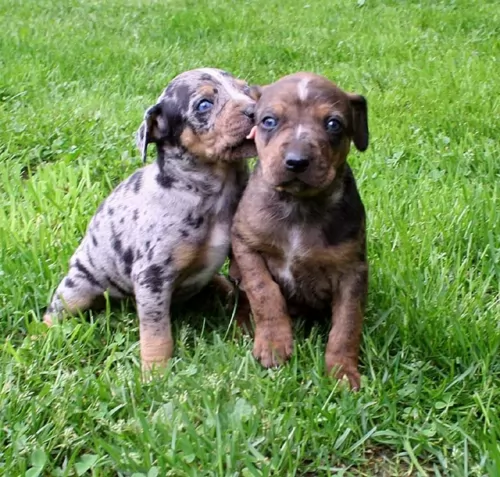 When you buy a Catahoula Cur, you can know that your pet is going to be fairly healthy, however there will be some common health issues to look out for, and by knowing about these health concerns, you can be better prepared.
When you buy a Catahoula Cur, you can know that your pet is going to be fairly healthy, however there will be some common health issues to look out for, and by knowing about these health concerns, you can be better prepared.
Your Catahoula Cur will be susceptible to some bacterial and viral infections which can be life threatening for him if he gets them. Some of these are parvo, distemper and rabies. That is why it is important to have your pet vaccinated, which can start at about 8 weeks of age for a puppy.
Obesity is a world-wide problem with humans and with their pets and it can open up a whole lot of problems with your pet’s health that he otherwise might not have got. It can play havoc with your pet’s digestion, and it can cause joint problems too.
It can be so tempting to pop a sweet treat into your pet’s mouth because you love him so much, but get to know what foods can actually be hazardous for him.
 This is still a working dog and a terrier at that. They are high energy, athletic dogs. Feed a high-quality food at the rate of 1 to 2 cups per day, split into 2 meals. Treat are good for training but if your Brazillian Terrier is not hunting or working in some way, stay away from too much food and treats as he can easily become obese.
This is still a working dog and a terrier at that. They are high energy, athletic dogs. Feed a high-quality food at the rate of 1 to 2 cups per day, split into 2 meals. Treat are good for training but if your Brazillian Terrier is not hunting or working in some way, stay away from too much food and treats as he can easily become obese.
As mentioned previously, the biggest concern with this breed is hunting accidents or injuries. Look out for ear and skin infections or allergies. For the most part this is a hardy, healthy breed.
A very energetic dog, the Brazillian Terrier like its ancestors has a need to work off that energy. Yes, he is an urban dog and can live in an apartment, but you better have a dog park or a competition or some place to hunt because his need for exercise cannot be answered by daily walks and running around an apartment. IF your Brazillian Terrier is not stimulated physically and mentally on a daily basis he will become destructive, hyperactive and very, very unhappy. Don’t just stick him in a yard and leave him either as terriers are known to dig and escape and he will too.
They excel at agility, flyball, obedience and confirmation. They love to chase things and they love to explore. Barn Hunt would also be a good game for them. They are very smart, so their physical exercise should be paired with mental stimulation.
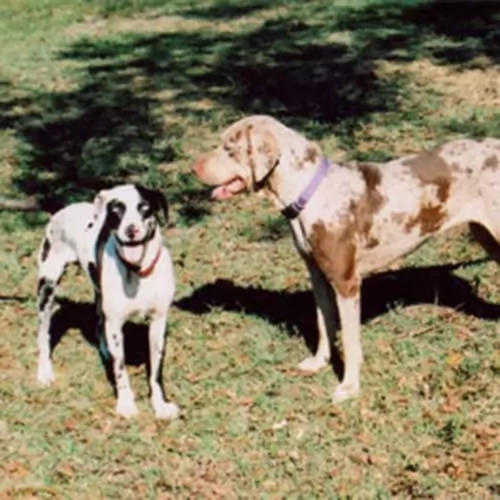 Your Catahoula Cur isn’t a high maintenance dog and a good brushing 2 times a week will keep his leopard coat looking shiny and free of loose hairs.
Your Catahoula Cur isn’t a high maintenance dog and a good brushing 2 times a week will keep his leopard coat looking shiny and free of loose hairs.
Catahoula’s have good teeth, and you want to keep them that way by brushing them at least 2 or 3 times a week to prevent dental decay and a host of other medical issues.